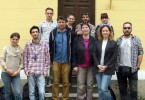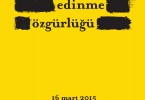Niyazi Dalyancı
The cacophony over the alleged “Action Plan against Religious Radicalism” continued to dominate the political agenda in Turkey as all the actors on opposing sides of the debate entrenched themselves in their positions refusing to yield an inch of territory to their rivals. Two separate meetings within two weeks between Prime Minister Recep Tayyip Erdogan and Chief of Staff Gen. Ilker Basbug lasting more than an hour each, seemingly did not help to defuse the tensions either.
At a lengthy news conference at the headquarters of the General Staff, Gen. Basbug met with veteran Turkish journalists and declared that after meticulous research and investigation within the army ranks and computers, no evidence had been found that the document that outlined plans for undermining the government and eradicating the Fethullah Gulen movement was written by the allegedly undersigned Navy Col. Dursun Cicek. He said, since the forensic study was carried out on a photocopy, because the original was missing, the experts were not able to establish without doubt that the signature really belonged to Col. Cicek. No further investigation of the case would be carried out by the military prosecutors provided that no new evidence comes up, Gen. Basbug said, adding that the file was sent to the Chief Prosecutor in Istanbul.
Displaying ire at certain times, Gen. Basbug called on the civilian prosecutors to “find out who produced this piece of paper and what their purpose is.”
Turkey’s Army Chief complained that “certain circles” are conducting an “asymmetrical psychological warfare” against the armed forces and called on those “who are trying to define themselves and their political positions in terms of armed forces,” to “pull their hands off the army.”
When he was asked who those circles might be, Gen. Basbug said: “We have certain information which we will take to the National Security Council.” The National Security Council is a semi-military advisory body that brings together key government ministers and the nation’s top brass under the chairmanship of the President of the Republic. In fact, it was founded by the 1961 Constitution to give more say to the military in national issues.
Erdogan mentions possibility of an anti-government junta
Earlier in the week, Prime Minister Erdogan while departing for Europe held a short press conference at the airport and indicated that the armed forces would investigate if there are “efforts” within its ranks (aimed at undermining his government). “The prosecutors are carrying out the necessary investigation and we are also doing the same. I believe that the armed forces will also carry out such necessary investigation. The Chief of Staff knows what kind of investigation should be carried out in the armed forces. And I believe that they are doing it,” said Erdogan.
“No witch hunt in the army”
“We won’t allow those who kindle ideas or indulge in actions that are contrary to democracy and a state governed by law to survive in the armed forces. But this does not mean that we would launch a witch hunt within the armed forces,” said Gen. Basbug answering questions in his press conference. There must be solid and sufficient evidence in order to prosecute army members, he added. He also said that, he personally as the Army Chief pledges that such elements should not infiltrate into the ranks of the armed forces.
If new evidence is found, the military prosecutors can reopen the investigation into the controversial document, Gen. Basbug said.
AKP amends penal code to enable trial of officers at civilian courts
But what he did not know at the time of his press conference was an amendment passed by the Justice and Development Party (AKP) majority in the Parliament after midnight the same day. The amendment to the Turkish Penal Code enabled civilian courts to try military personnel who get involved in offenses against the state “in collusion with civilians.” The Parliament went into summer recess after passing the amendment which led to an outcry from the opposition benches.
The main opposition Republican Peoples Party (CHP) spokesmen called it a “midnight coup,” and claimed that they were never informed about the content of the legislation.
Justice Minister Sadullah Ergin denied charges that CHP was leveling against him and claimed he gave information about the amendment to the opposition deputies. He also rejected accusations that the amendment was related to Gen. Basbug’s assertion that military personnel would continue to be tried within the military jurisdiction.
“We passed the law before the Chief of Staff’s press conference. How could we have known what he had to say,” Justice Minister Ergin objected.
Alleged culprit of the “plan” summoned by prosecutors in Istanbul
Zekeriya Oz, the prosecutor of the Ergenekon case, lost no time in summoning Col.Cicek, the officer who signed the “Action plan” allegedly and eight other naval officers to testify before him in Istanbul.
AKP had filed a complaint with the Chief Prosecutor’s Office in Ankara asking for an investigation against unconstitutional actions against the legally elected government even before Gen. Basbug announced that the military investigation found no evidence that the “Action plan” was drafted by the armed forces. Prosecutor Oz will be interrogating the officers from Ankara within the context of AKP’s complaint.
Is there a fringe in AKP wanting a confrontation with the army?
Some press commentaries tell more than official statements about the current situation. One such article was written by a columnist of pro-government Yeni Safak newspaper. The columnist uses the pen name Yasin Dogan but it is public knowledge that the commentator is really Dr. Yalcin Akdogan, one of the closest advisors of Prime Minister Erdogan. He is known to coin the terms “conservative democrats” that Erdogan frequently uses to describe his party’s political stance.
The article published last week is full of praise for Gen. Basbug.
“Basbug is trying not to function as somebody who creates problems, generate tensions or deepen crises. This of course, undermines the plans of those who want to see the army operate as an opposition. Both those who provoke the AK Party against the soldiers and those who prove the soldiers against the AK Party are seriously upset by this,” writes Akdogan.
Of course, Akdogan’s comments immediately invoked the question, “Who are those who provoke AKP against the military?”
Radikal newspaper’s Ankara commentator Murat Yetkin who quotes Akdogan asks, “Is it the Fethullah Gulen movement?”
Milliyet’s Kadri Gursel goes one step further and declares that the circles that Gen. Basbug accused of launching an “asymmetrical psychological warfare” against the armed forces are none other than followers of Fethullah Gulen now occupying key positions in the media and bureaucracy.
Gursel points out that this warfare that the Army Chief refers to is less related to whoever drafted it than to those who leaked it to the press. “And following that, to use another military term like ‘swarming,’ the intensive media attack against the military,” observes Gursel.
Fethullah Gulen’s transatlantic video statement
Gulen, who began his career as a preacher of Islam and built a global empire consisting of schools, youth hostels and media companies, has been living in self-imposed exile in Pennsylvania, U.S. since March 1999, although the case opened against him on charges of setting up an illegal organization with the aim of establishing an Islamic state in Turkey ended with his acquittal in 2007. Gulen has always denied that he has an organic relationship with the schools and companies related to his movement and claims that the entire movement operates on a volunteer basis.
However, recently his website posts his video statements often on political issues and lately he did not miss the opportunity to comment on the “Action plan.”
“There have been such plans, maybe 30 times, to terminate something that does not exist. Is there anything that is contrary to the people, contrary to the future, contrary to democracy and to humanity that you want to terminate? These things have always existed and will continue to recur in the future,” says Gulen in his video statement.
“These things should not cause hesitation, awe or disruption in people who have dedicated themselves to a cause, who believe in Allah and who have found the true path. That is to say, they should not pay any heed to these words coming from left or right and continue to walk on the correct path for the sake of the nation, for the sake of humanity and the world in general,” Gulen advised his followers.
As the matter stands, the developments during the last two weeks let alone shedding light on the central questions of the controversy rendered it more intricate. Who has produced the “Action Plan” that has shaken the political scene in Turkey? Is it the work of anti-government junta within the armed forces, or a ploy by supporters of Fethullah Gulen to discredit the army? Who leaked the document that is supposed to be kept secret in the files of the Ergenekon prosecutors? Did Erdogan or members of his government know beforehand that such a document existed? These questions will be asked again and again in the coming weeks. There is little chance for the general public to know the answers.






